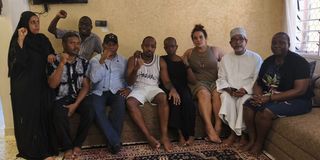Premium
Tanzania deports Boniface Mwangi, dumps him in Ukunda
Kenya says Tanzanian authorities have freed activist Boniface Mwangi following days of detention in Dar es Salaam.
A spokesperson of Prime Cabinet Secretary Musalia Mudavadi, also the Foreign and Diaspora Affairs Cabinet Secretary, said Mwangi was freed on Thursday morning but added no further detail on his health condition or where he had been freed.
But Nation learnt that Mr Mwangi was dropped near the border between the two countries at the coast.

Activist Boniface Mwangi is reunited with his family.
His family revealed that Mr Mwangi was deported from Tanzania by road and abandoned in Ukunda. He has been rushed to hospital for medical checks.
The revelations could close a chapter on three days of intense protests from Mwangi’s family, the human rights fraternity and Kenyans in general after he was disappeared by Tanzanian authorities in Dar es Salaam. Or they could reopen old wounds of mistrust between citizens and their governments on the issue of freedoms and human rights.
On Wednesday, the Kenyan government had formally protested Tanzania’s detention of Boniface Mwangi, accusing Dodoma of refusing consular access to the Kenyan national.
Kenya wrote to Tanzania asking that Dodoma allows Kenyan diplomats access to Mr Mwangi who had not been seen since he was arrested and detained at a police station in Dar es Salaam before he vanished.
The letter was shared publicly by Foreign Affairs Principal secretary Korir Sing’oei on Thursday.
“The Ministry notes that despite several requests, officials of the government of Kenya have been denied consular access and information to Mr Mwangi. The Ministry is also concerned about his health, overall wellbeing and the absence of information regarding his detention,” the letter, formally known as a note verbale, said.
Under the Vienna Convention on Consular Relations, accredited diplomats should access nationals detained in the host country to be able to assist their cases or help them communicate with their families. Kenya said refusing this privilege would violate the treaty which both Kenya and Tanzania are signatories.
“In light of the above, the Ministry of Foreign and Diaspora Affairs respectfully urges the Government of the United Republic of Tanzania to expeditiously and without delay facilitate consular access to or release Mr Mwangi in accordance with international legal obligations and diplomatic norms,” PS said.
The details of Mr Mwangi’s detention came a day after Prime Cabinet Secretary Musalia Mudavadi, who is also the Foreign and Diaspora Affairs Cabinet Secretary, had indicated Tanzania had allowed a Kenyan consular official to access Mr Mwangi but did admit Kenya had no idea why he was being held.
In fact, the consular official from Kenya’s High Commission in Dar es Salaam was only allowed to see Mr Mwangi at the police station. Mwangi was later whisked away to an unknown location.
This disappearance has seen rights activists protests and pile pressure on the Kenyan government to rescue its national. Mr Mwangi was arrested with Ugandan activist Agatha Atuhaire who is also missing. Amnesty International demanded for their immediate freedom.
“Their Tanzanian lawyers were informed they were to be deported but the authorities have gone silent and their whereabouts unknown,” said Irungu Houghton, Executive Director of Amnesty International Kenya.
“We are beginning to treat this as an abduction,” he added, saying the two should be returned to their homes.
Mr Mwangi went missing on Tuesday, just a day after complaining that suspected police officers had camped outside his hotel room in Dar. It is routine for Tanzanian police to knock on doors of foreigners lodging in local hotels to check their papers. However, on this occasion, it was unclear whether the intent was to check papers or arrest him. Mwangi made noise about it on X.
He had travelled to Tanzania together with other activists to stand in solidarity with the opposition leader Tundu Lissu, who was arraigned on Monday. Tanzanian authorities said they allowed in dozens of observers to watch the case.
Mwangi was allowed to enter the country, but was not able to go to court when Mr Lissu was arraigned.
Tanzanian President Samia Suluhu later said that she would not allow people from other countries to cause chaos in her country.
“We have started seeing a trend where some activists from our neighbouring countries are trying to meddle in our business. If they have been contained in their country, let them not try to come to ruin our peace,” Mama Suluhu said.
Earlier on, Prime Cabinet Secretary and Foreign Affairs Cabinet Secretary Musalia Mudavadi had defended President Suluhu’s remarks.
“I will not protest that because I think there is some truth,” he said on Citizen TV on Tuesday night.
“Let us face a few facts. The level of etiquette, insults that we see in Kenya, even though we have the freedom of speech, is sometimes going overboard to some extent. She is saying people have sometimes gone to extremes in their utterances in Kenya, which is a fact…
“What we need to talk about is, can we get to the bottom of the treatment there…the fact of the matter is that our approach and our utterances, because we are free in speech, have lacked in integrity.”
That comment earned the CS an avalanche of online criticism with some commentators accusing the government of doing little to protect Kenyans abroad.


